Trump impeachment trial: Senators question House managers, Trump lawyers
Senators have up to 16 hours for questions in this phase of Trump's trial.
In unpredictable new phase, senators begin up to 16 hours of questions to House managers, Trump defense team
Senators send written questions to Chief Justice Roberts, who reads them aloud
John Bolton's reported allegations dominate debate over whether Senate should allow witnesses
President Donald Trump's Senate impeachment trial entered an unpredictable new phase Wednesday as senators engaged in up to 16 hours of posing questions to House impeachment managers and the president's legal team.
After sitting at their desks in silence for long days listening to opening arguments from both sides, senators were able to submit questions written on small cards to Chief Justice John Roberts, who then read the question aloud to the chamber.
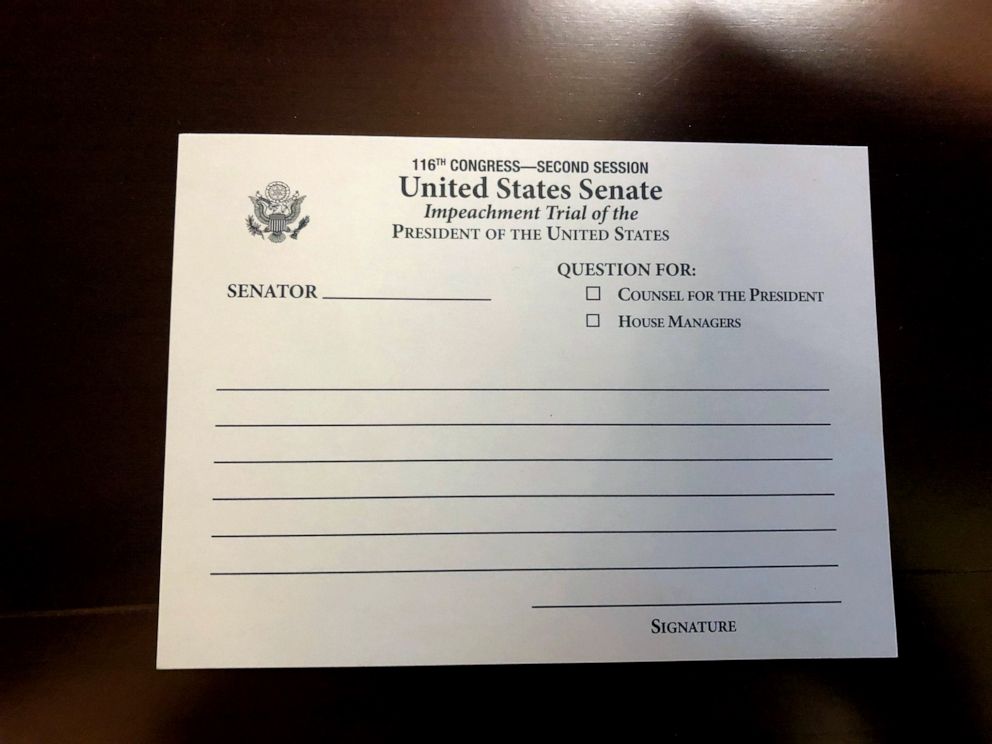
The questioning gives both sides one last chance to make their case to senators before they vote as early as Friday whether to allow witnesses, especially former national security adviser John Bolton, who reportedly claims in a new book that Trump told him he was withholding U.S. aid to Ukraine until Ukraine agreed to investigate former Vice President Biden and his son, Hunter.
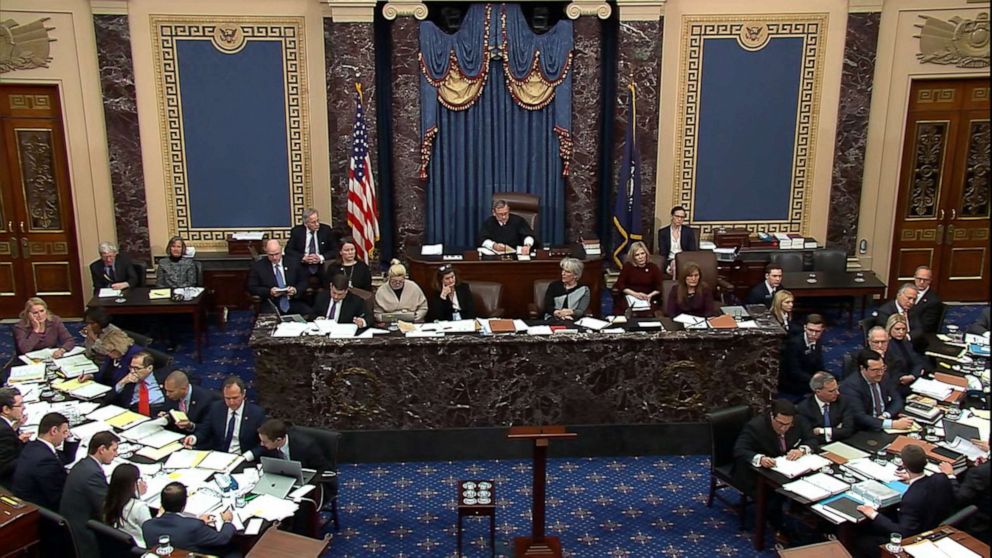
The ABC News team of correspondents and producers is covering every aspect of this story.Here is how the day unfolded.
11:05 p.m. Calling it a day
Mitch McConnell adjourned Wednesday night’s session at 11:05 p.m. with the trial set to resume Thursday at 1 p.m.
But it wasn't adjourned without one slip-up just before the buzzer.
Perhaps the most hearty round of laughter so far during the trial came when Sen. Roy Blunt, a Missouri Republican, was introducing his question on behalf of several senators and named former Missouri Democratic Sen. "McCaskill" instead of Arizona Republican Martha McSally.
"I send a question to the desk on behalf of myself, Sens. McCaskill -- or McSally rather (laughter) – Lankford, (boos). That was a terrifying moment," Blunt quipped, drawing another outburst of robust laughter.
"On behalf of myself, Sen. McSally, Sen. Lankford, Sen. Gardner, Sen. Capito and Sen. Wicker; this is a question for the president’s counsel," Blunt said, setting the record straight.
10:47 p.m. Schiff accuses White House of shifting argument
Rep. Adam Schiff called Patrick Philbin’s argument about foreign contributions is "a remarkable evolution of the president’s defense."
"What counsel for the president is now saying is even if he could have, that's OK," Schiff said. “It's now OK to criminally conspire with another country to get help in a presidential election as long as the president believes it would help his campaign and therefore it would help our country. That's now OK."
"It's OK to ask for that help. It's OK to work with that power to get that help. That's now OK," Schiff stressed. "It's been a remarkable evolution of the presidential defense. It began with, 'none of that stuff happened here.' It began with 'nothing to see here.' It migrated to, 'OK, they did seek investigations of the president's political rival.'"
"And then it became OK," Schiff continued.
"We’ve witnessed over the course of the last few days and the long day today a remarkable lowering of the bar to the point now where everything's OK as long as the president believes it's in his reelection interest. You could conspire with another country to get their help in your election either by intervening on your behalf to help you or by intervening to hurt your opponent and now we're told that’s not only OK but it's beyond the reach of the Constitution -- and why?" Schiff wondered. "Because abuse of power is not impeachable because if you say abuse of power's impeachable, well then you're impeaching people, presidents, for mere policy. Well that's nonsense."
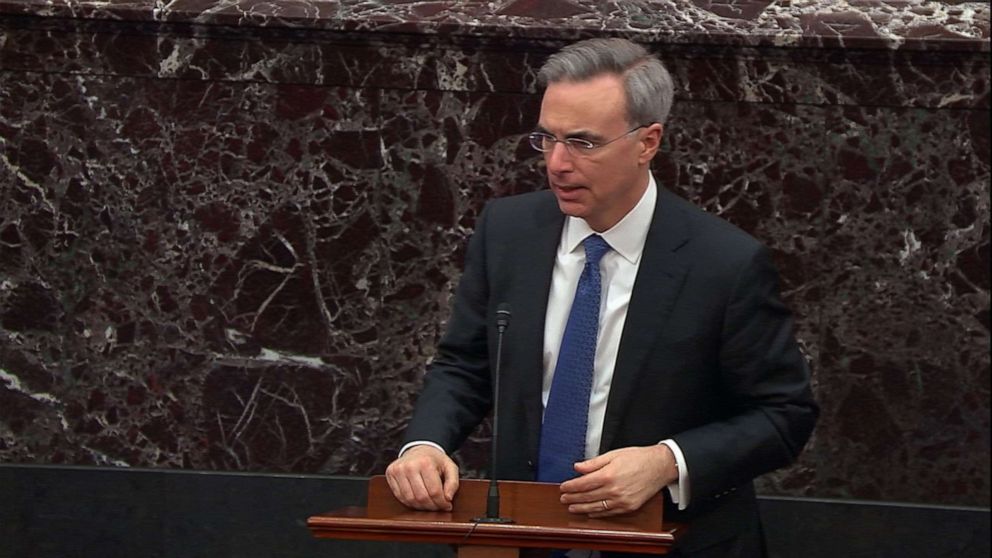
10:21 p.m. McSally: 'It is time to vote'
Another Republican senator up for reelection this fall has come out against witnesses.
Sen. Martha McSally, R-Ariz., took to Twitter to say it's "time to vote."
She sent out a lengthy string of tweets, saying, "The House Democrats have repeatedly claimed their case has overwhelming evidence—the same House Democrats who could have handled this matter through a bipartisan oversight process.
"A dangerous precedent will be set if we condone a rushed, partisan House impeachment with no due process that shuts down the Senate for weeks or months to do the House's work."
10:03 p.m. Before break exchange on foreign help
There was an interesting and important exchange just before the break when Pat Philbin made the case that while Trump cannot accept foreign campaign contributions, he could accept information from a foreign source.
"Mere information is not something that would violate the campaign finance laws and if there is credible information -- credible information of wrongdoing by someone who is running for public office -- it’s not campaign interference for credible information about wrongdoing to be brought to light, if it's credible information," Philbin argued. "So I think that the idea that any information that happens to come from overseas is necessarily campaign interference is a mistake."
"That's a non sequitur," he continued. "Information that is credible that potentially shows wrongdoing by someone who happens to be running for office, if it's credible information, is relevant information for the voters to know about for people to be able to decide on who is the best candidate for an office."
9:54 p.m. Mitt Romney questions date, and one more break
Before going on a 15-minute break leading up to a promise of final questions, Mitt Romney asked White House lawyers to identify the exact date that Trump ordered the hold on military aid, but the lawyer didn't answer it -- instead pointing to evidence in the record.
Pat Philbin responded, "I don't think that there is evidence in the record of a specific date, but there is testimony in the record that individuals ... were aware of a hold as of July 3 and there is evidence in the record of the president's rationales from even earlier than that time; there is an email from June 24 has been publicly released."
Philbin continued to point to testimony from witnesses in the House impeachment depositions that showed they were aware on July 3, but he only pointed to what was in the House record.
House managers and White House lawyers disagree as to whether the chief justice can rule on the issue of production of exhibits and testimony of witnesses over the objection of either the managers or Trump's counsel.
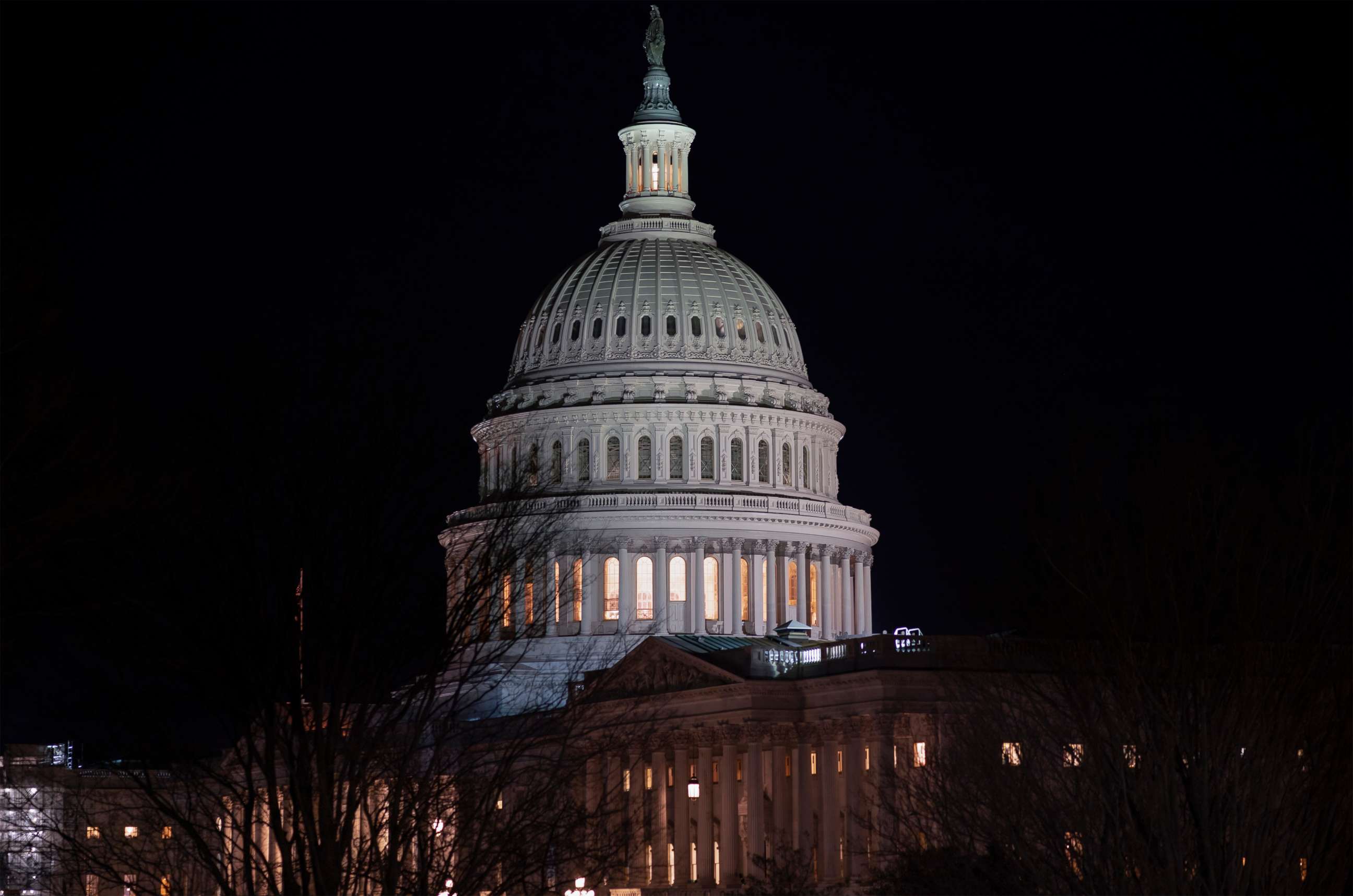
8:26 p.m. Schiff, Sekulow trade jabs
In one of the strongest and most energetic exchanges of the day, Trump lawyer Jay Sekulow and Rep. Adam Schiff went back-and-forth on the issue of witnesses and their potential impact on the trial.
Sekulow began by detailing his witness wish-list:
"If this body were to grant witnesses ... I want Adam Schiff. I want Hunter Biden. I want Joe Biden. I want the whistleblower," he said. "If we get anybody we want, we'll be here for a long time."
"We're not here to argue witnesses tonight, but it obviously is an undercurrent," Sekulow said.
Looking at Schiff, he rhetorically asked why Democrats need witnesses if they have proved their case: "Not because you need it, but because you want it."
Schiff responded a few minutes later, teed up by Sen. Chuck Schumer, saying, "I think we can all see what's going on here and that is if the House wants to call witnesses, if you want to hear from a single witness, if you want to hear what John Bolton has to say, we are going to make this endless."
After Sekulow threatened to call for his testimony, Schiff said he'd want to question Sekulow about his contacts with Lev Parnas, as well as Trump. "But we're not here to indulge in fantasy or distraction. We're here to talk about people with pertinent and probative evidence," he continued.
"They're doing the same thing to the Senate they did to the House, which is you try to investigate the president, you try to try the president, we will tie you and your entire chamber up in knots for weeks and months. And you know something -- they will if you let them," Schiff added.
"I'm no fan of John Bolton, although I like him a little more than I used to, but you should hear from him -- you should want to. Don't take Gen. [John] Kelly's view for it! Make up your own mind whether to believe him," Schiff said.
7:44 p.m. After GOP raises Hunter Biden, Democrats bring up Ivanka Trump and Jared Kushner
Democrats are quickly getting personal in this post-dinner round of questioning, following the repeated discussion of Hunter Biden today.
Sens. Udall, Leahy and Whitehouse ask the House managers if, under the standard set by the White House team regarding Hunter Biden, Jared Kushner, the president's son-in-law, and daughter Ivanka Trump, should come under investigation.
Chief Justice Roberts read the question: "The president's team has argued that Hunter Biden’s involvement with the Ukrainian energy company Burisma created a conflict of interest for his father, Joe Biden. President Trump, the Trump Organization and his family including, those who serve in the White House maintain significant business interests in foreign countries and benefit from foreign payments and investments. By the standard the president's counsel has applied to Hunter Biden, should Mr. Kushner and Ms. Trump's conflict of interest with foreign governments also come under investigation?"
Rep. Val Demings, D-Fla., responds for the managers, and doesn't directly answer the question, but she also doesn't dismiss the equivocation. Instead, she encourages the Senate to focus on the charges against Trump.
“Let us stay focused. This doesn’t have anything to do with the president’s children, or the Biden children. This has to do with the president’s wrongdoing," she says.
Looks like the Senate doesn't get the message: Republicans' next question, from Sens. Crapo, Risch, Cruz, Graham, Braun, Moran and Bozeman, ask the president's team if encouraging an investigation into Burisma is within the national interest and efforts to fight corruption.
White House lawyer Pat Philbin responds by defending Trump's references to Biden/Burisma in his call with Zelenskiy.
Sen. Durbin asks the House managers to respond; Rep. Sylvia Garcia, D-Texas, is responding, again pointing out that Trump only pushed for the Biden investigations in light of the 2020 election/polling.
5:57 p.m. Inside the Senate chamber: Focused senators, snack packs
From ABC's Allison Pecorin inside the Senate chamber:
The seriousness of the room is clear. Members are vigorously taking notes, passing notes to one another, and walking in and out of the chamber to strategize.
Almost everyone appears focused. Emphasis on almost...
I watched as a Senate page handed a large envelope to Sen. Ben Sasse who opened it, grinned, and then directed the page to bring the envelope over to Sen. Richard Burr’s desk. Burr opened the envelope and revealed that it was full of individually packaged snacks, which Burr covertly dumped into his desk drawer.
For other senators though, the note taking is furious. A few of the senator question cards were visible from my vantage point and it appears that several of the senators are writing their questions on the back of the cards.
The president’s attorneys are moving efficiently, although during Blumenthal’s question concerning what the president’s legal team knew of the Bolton book manuscript, I could see some ping-ponging between Patrick Philbin, Jay Sekulow and Pat Cipollone as they appeared to debate who would tackle the question.
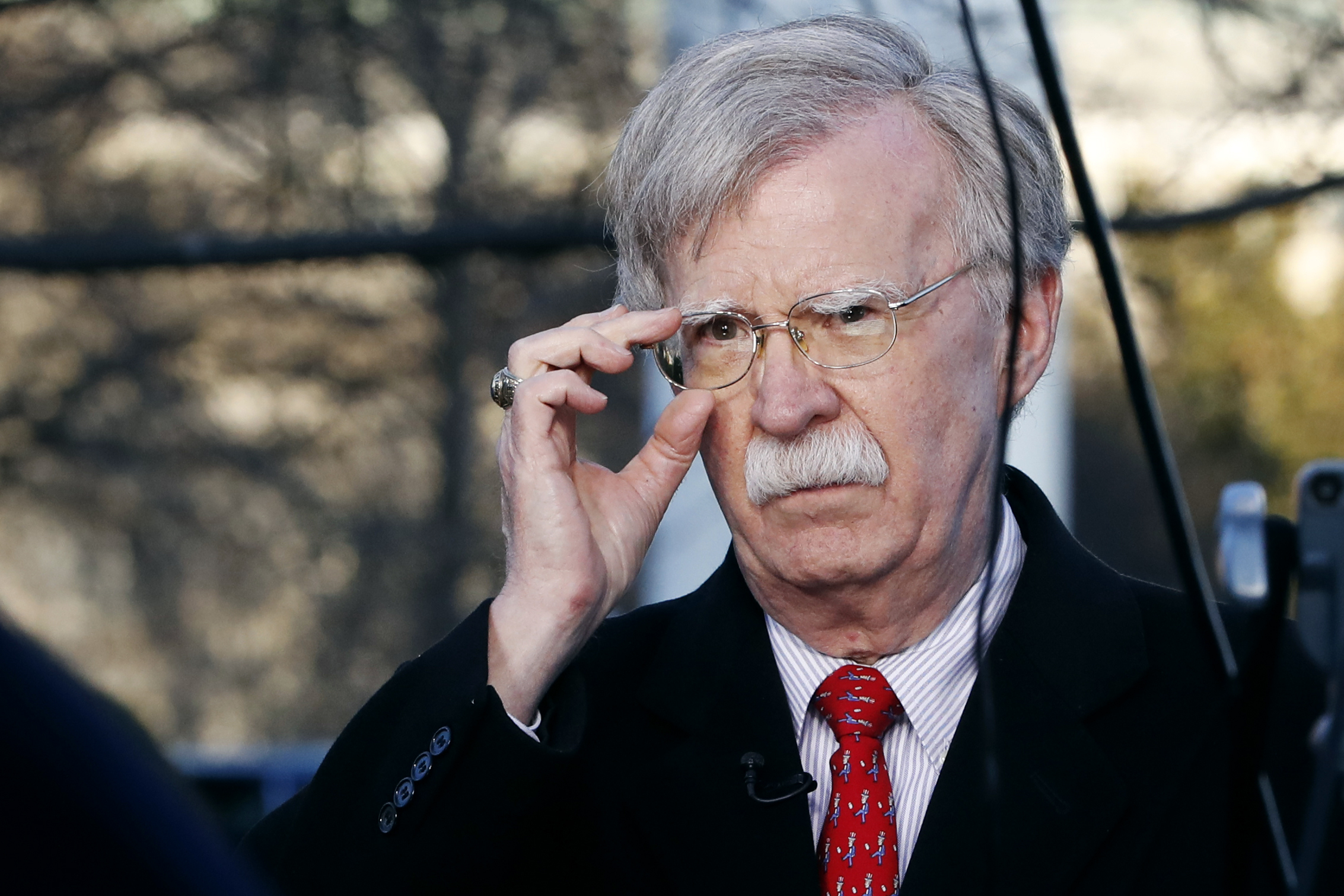
5:27 p.m. Democratic senators: Can adverse inferences be drawn?
Several Democratic senators ask the House managers if they should apply a legal precedent to the impeachment case where if if a party in a case moves to conceal information or prevent a witness from testifying, the court can assume that evidence would be damaging to the person seeking to prevent it from being part of the case.
"Are you entitled to draw an inference that those records they refused to turn over and the State Department the fact that they won't allow John Bolton's notes to be turned over or Ambassador Taylor's notes to be turned over. Should you draw an adverse inference? You're darned right you should," Schiff says.
"But you shouldn't rely on an inference here, not when you have a witness who's willing to come forward," Schiff says. "There was no need for inference here, there's just a need for a subpoena."
5:07 p.m. Blumenthal: Bolton book blocked for political reasons?
In another example how John Bolton and the allegations he reportedly makes in a new book are dominating the session, Democratic Sen. Richard Blumenthal asks: "Did anyone in the White House or outside the White House tell anyone in the White House counsel's Office the Publication of the Bolton book would be politically problematic for the president?" referring to a White House letter released earlier in the day blocking publication, stating concerns over classified information.
White House lawyer Patrick Philbin responds: "Thank you mister chief justice, thank you senator for the question. No, no one from inside the White House or outside the White House told us that the publication of the book would be problematic for the president I think we assumed it Mr. Bolton was disgruntled and we didn't expect he was going to be seeing a lot of nice things about the president but no no one told us anything like that."
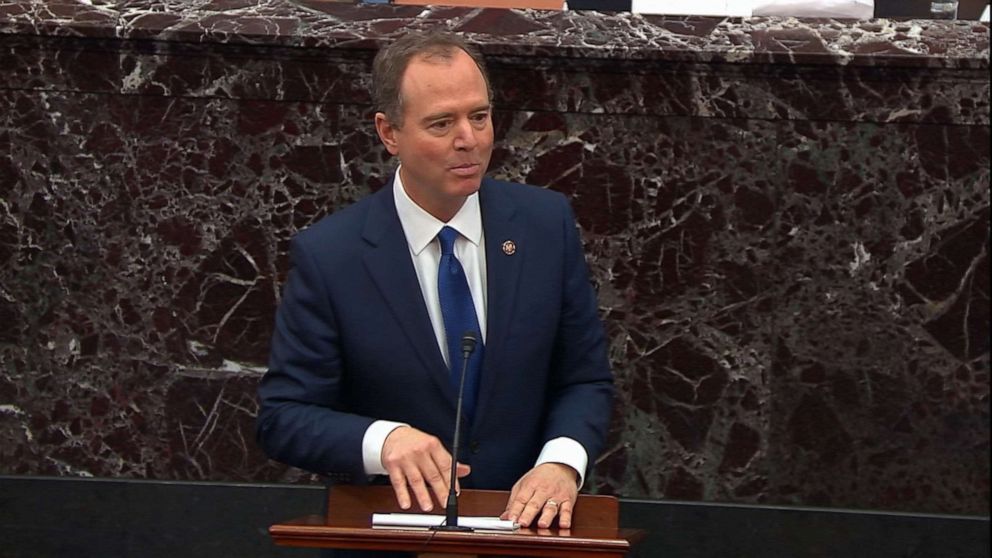
House manager Adam Schiff argues there are questions about whether the Trump legal team or anyone else in the White House knew about allegation in the Bolton books, besides those on the National Security Council charged with evaluating it for classified information. The NSC put out a statement that the manuscript had not been shared.
“Their statement was very precisely worded, ‘the NSC unit reviewing the book did not share the manuscript,': Schiff says, "Well, that's a different question than whether the White House lawyers found out what's in it,” Schiff says.
“You don't have to circulate the manuscript to have someone walk over to the White House and say you do not want John Bolton to testify, let me tell you, you do not want John Bolton to testify, you don't need to read this manuscript because I can tell you what's in it,” Schiff says.
“The denial was a very carefully worded one. I don't know what the White House lawyers knew when they knew it but they did represent to you repeatedly that the president never told a witness that he was freezing the aid to get Ukraine to do these investigations and we know that's not true you know that from the witnesses we've already heard from,” Schiff says.
4:50 p.m. Collins asks whether Trump ever talked about the Biden and Ukraine corruption before Biden entered the race.
ABC's Katherine Faulders reports:
GOP Sen. Susan Collins asks the president's legal team on behalf of herself and Sen. Lisa Murkowski whether President Trump even mentioned the Bidens in relation to corruption in Ukraine before Biden entered the race last spring and if so, to whom and when.
The question appears to suggest that Collins doesn't 100% believe that Trump was interested in rooting out corruption in Ukraine and she clearly wants to get to the timeline.
White House deputy counsel Patrick Philbin appears to confirmed that Trump didn't mention them before April 2019 when Biden jumped into the race. He leaves himself somewhat of an out by saying it's not in the House record.
"Of course I think it's important the outset to frame the answer by bringing that I'm limited to what's in the record and what's in the record is determined by what to the House of Representatives sought. It was there a preceding they were the ones who ran it they were the ones who called the witness is so part of the question refers to conversations between President Trump and other Cabinet members like that there's not something in the record on that," Philbin says. "It wasn't thoroughly pursued in the record so I can't point to something in the record that shows President Trump at an earlier time mentioning specifically something related to Joe or Hunter Biden."
During the next question that Schiff answered he addressed this, saying they are not confined to the record in the House.
"Counsel says in answer to the senator’s question about whether Donald Trump ever brought up the Hunter Biden problem with President Poroshenko in the past and says, 'Well, we’re confined to the record before us.' You're not confined to record in the House nor is the president the president could call witnesses if they existed there's nothing preventing them from saying as a matter of fact tomorrow we're going to call such and such and they're going to testify that indeed Donald Trump brought up Hunter Biden to President Poroshenko."
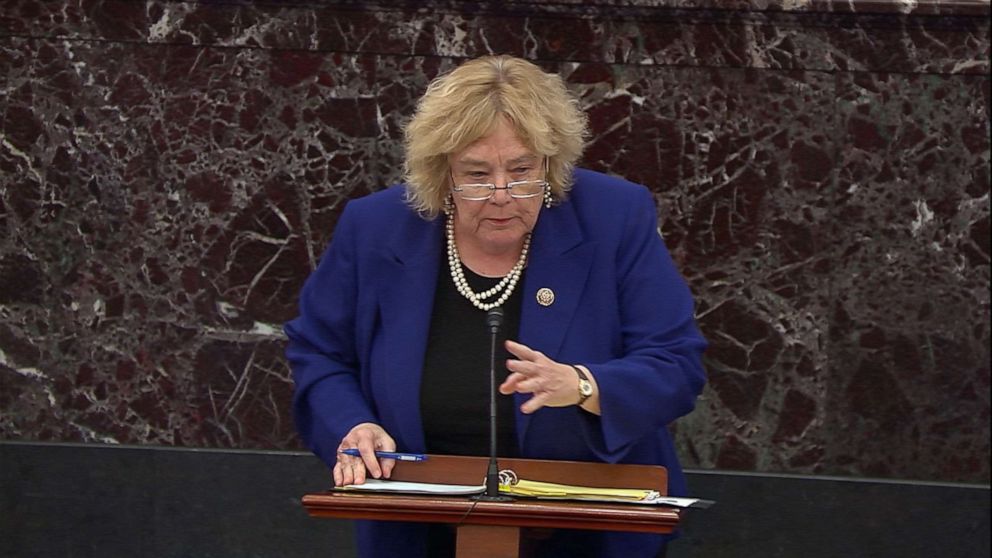
4:32 p.m. House manager Lofgren warns of consequences of obstruction
Democratic senators asks the House managers if there is any precedent for a president to refuse to cooperate with Congress on an investigation and the possible consequences if the Senate votes to acquit him despite those decisions to block witnesses and withhold documents.
House manager Zoe Lofgren calls the president's actions an "extreme measure" to hide evidence from Congress and that no other president has ordered a witness not to cooperate with an impeachment inquiry.
She argues if the Senate doesn't move strongly against that obstruction it could make it impossible for Congress to conduct oversight of future presidents.
"If the president can say, you're not sending any witnesses. We are not sending documents. We don't have to. We don't like your processes. We have a wholesale rejection of what you are doing. That is not the way our constitution was created. For each body has responsibility. There is a sharing of power. I, and I know you cherish the responsibility that we have. That will be eviscerated if the president's complete stonewalling is allowed to persist and be accepted by this body," she says.
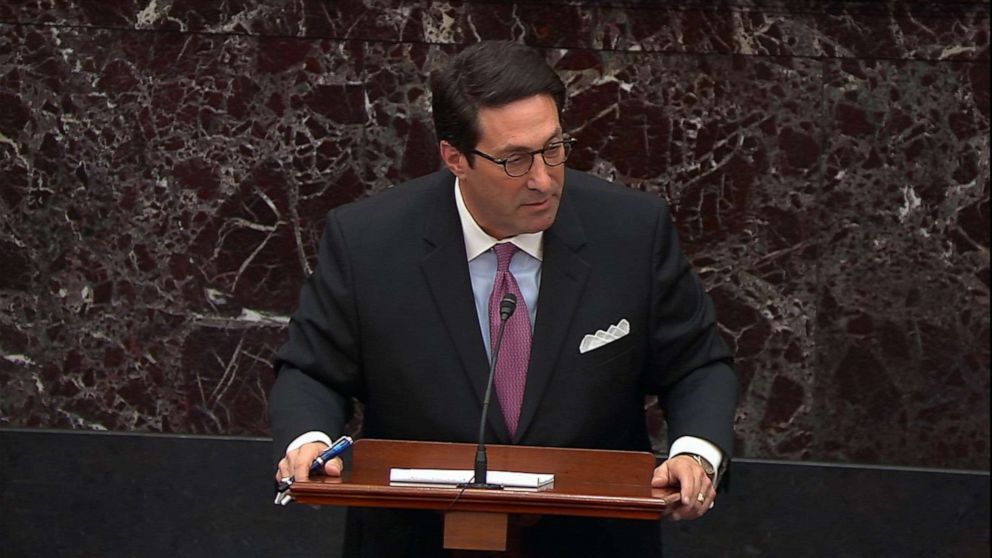
4:14 p.m. Trump lawyer warns senators about calling witnesses
"As we get down the road in the witness issues, let's be clear," Jay Sekulow says. "It will it should not be like ... certainly I can't dictate to this body -- it should certainly not be though that the House managers get John Bolton and the president's lawyers get no witnesses. We would expect if they're going to get witnesses we will get witnesses and those witnesses would then but all that -- just to be clear -- changes the nature and scope of the proceedings ..."
“This will be the first impeachment trial in history that involves no witnesses if you decide you don't want to hear from any that you simply want to rely on what was investigated in the House,” Schiff responds.
Schiff argues that any potential witnesses could be quickly deposed and Chief Justice Roberts could quickly rule on evidentiary issues.
“If there’s any question about it the chief justice can resolve these are relevant questions to the matter at hand what you cannot do is use privilege to hide wrongdoing of an impeachable kind and character,” he adds.
3:08 p.m. Graham and Cruz ask hypothetical about President Obama and probe of Mitt Romney's son
GOP Sen. Lindsey Graham sends a question from himself and Sen. Ted Cruz directed at the House managers: “... If President Obama had evidence that Mitt Romney's son was being paid $1 million per year by a corrupt Russian company and Mitt Romney had acted to benefit that company, would Obama have authority to ask that that potential corruption be investigated?”
Schiff responds by saying that the hypothetical situation that the GOP senators proposed is, “a bit off.”
“The reality is for a president to withhold military aid from an ally or in the hypothetical, to withhold it to benefit an adversary to target their political opponent is wrong and corrupt, period, end of story,” Schiff says.
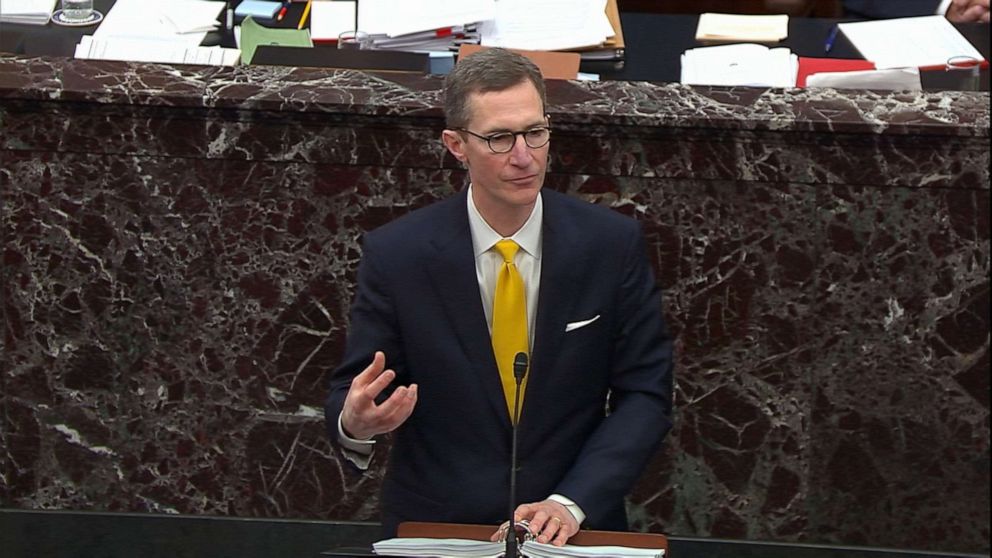
3:09 p.m. Cornyn asks the consequences of the Senate subpoenaing a president's advisers
Republican Sen. John Cornyn asks the White House legal team: “What are the consequences to the presidency, the president's constitutional role as the head of the executive branch and the advice the president can expect from his senior advisers if they expect ... subpoenas in this particular trial without any determination by an Article III court?”
White House deputy counsel Patrick Philbin responds by arguing that confidential communication is vital to government function.
“Because if you don't have the confidence that what you're saying is going to be kept confidential, you won't be candid,” Philbin says. “You won't give your best advice. And that damages decision making.”
2:55 p.m. Inside the Senate chamber: Collins taking nonstop notes.
From ABC News Senior Congressional Correspondent Mary Bruce inside the Senate chamber:
The mood is totally different in the chamber from days past. Everyone has perked up and the full Senate is paying close attention.
GOP Sen. Susan Collins is still writing nonstop. It's constant. She’s going to need a wrist brace soon. Republican Sen. Lisa Murkowski, sitting next to Collins, is listening intently, occasionally jotting notes on a small pad. GOP Sen. Lamar Alexander is doing the same.
There’s not a lot of movement, except for GOP Sen. Lindsey Graham who is still in and out of the chamber constantly.
The choreography of the questioning is fascinating theater.
Senators are called on one by one. They then stand, hand their question card to a Senate page who scurries quickly down the center aisle and up to front where the card is passed off to Chief Justice Roberts.
There is also a stark contrast between the two lead tables.
The House managers are a flurry of activity. Papers strewn everywhere. We have been told they prepped for every possible question they could think of and you can tell. They all have massive binders with many, many different organized sections. They are reading much of their answers from typed up responses.
The Trump team table, by contrast, is much calmer. There is a bit of note taking and talking between the lawyers. They are also holding up paper cue cards to indicate to their colleagues when it’s time to wrap.
I was also struck by the fact that White House counsel Pat Cipollone wasn’t taking any notes -- just sitting there, with a blank legal pad in front of him, twiddling constantly with a pen, shifting and re-positioning it.
2:14 p.m. Dershowitz argues a quid pro quo done in belief it's 'in the public interest' not impeachable conduct
A question from GOP Sen. Ted Cruz brings the debate to the question of a quid pro quo. Former Harvard Law School professor Alan Dershowitz and House manager Rep. Adam Schiff debate the notion of a quid pro quo as a matter of law and a matter of foreign policy.
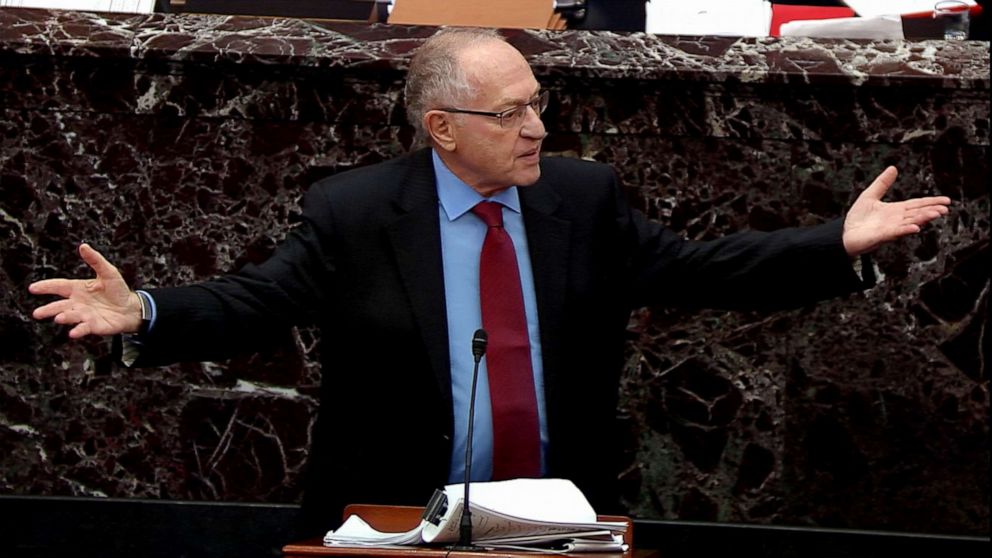
“The only way that would make a quid pro quo unlawful is if the quo were in some way illegal,” Dershowitz says.
"If a president does something which he believes will help him get elected in the public interest, that cannot be the kind of quid pro quo that results in impeachment," he says.
"Every public official that I know believes that his election is of the public interest," he adds.
1:31 p.m. Trump lawyers claim Mulvaney comments on a quid pro quo 'misunderstood'
We have heard very little from the president's lawyers about acting White House Chief of Staff Mick Mulvaney's infamous comments at the White House to ABC News Chief White House Correspondent Jon Karl admitting a quid pro quo about the freezing of military aid to Ukraine - so little that Democrats have accused them of ignoring and downplaying the exchange.
But today, in a new twist, Trump lawyer Philbin says Mulvaney's initial remarks in the briefing room were "garbled and misunderstood."
"It's been clear in the record since that press conference that what he was saying was garbled and or misunderstood and he immediately clarified," he says, quoting Mulvaney's statement hours later following the news conference.
1:53 p.m. Philbin argues Democrats are trying to impeach over policy differences
In response to a question from Sen. Mike Lee, R-Utah, about the president's ability to set foreign policy, White House deputy counsel Patrick Philbin argues that Trump alone has the ability to set foreign policy as commander in chief.
Democrats, he continues, are trying to impeach Trump over policy disagreements that he says should be settled in the next election.
"The president cannot defy the agencies within the executive branch that are subordinate to him. It is only they who can defy the president's determinations of policy. What this all boils down to is it shows that this case is built on a policy difference and a policy difference where the president is the one who gets to determine policy because he's been elected by the people to do that.
"We're right now only a few months away from another election where the people can decide for themselves whether they like what the president has done with that authority or not. That's the way disputes about policy like that should be resolved," he answers.
1:39 p.m. Democrats ask whether Bolton was asked to testify
The second question from Democrats comes from Massachusetts Sen. Ed Markey about whether Bolton was asked to testify. Schiff again fields the question, speaking at length that Bolton was asked to testify but not subpoenaed after Bolton's deputy Charles Kupperman went to court to fight a House subpoena.
"It's a danger to have a president who would engage in this conduct. It's a danger to have a trial with no witnesses and set that precedent, Schiff says. "But the biggest danger of all would be to accept the idea that a president could abuse the office in this way and the Congress is powerless to do anything about it. That is certainly not what the founders intended."
Rep. Jason Crow, D-Colorado, a House impeachment manager, fields a question from Sen. Dianne Feinstein about whether Trump ever tied security assistance to investigations, ending his answer by making the case for witnesses once again.
"Again, if you have any lingering questions about direct evidence, any thoughts about anything we just talked about, anything I just relayed or that we've talked about the last week, there is a way to shed additional light on it. You can subpoena ambassador Bolton and ask him that question directly," he says.
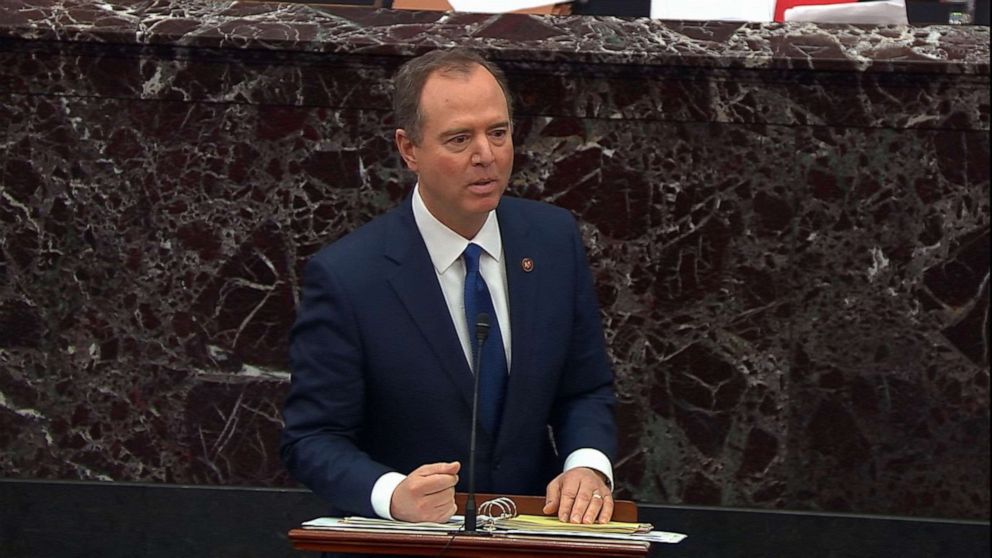
1:31 p.m. Schiff answers a fair trial must have witnesses
Minority Leader Chuck Schumer essentially tees up the House managers to make the case for witnesses, referencing the reported allegations in Bolton's book.
"There's no way to have a fair trial without witnesses," Rep. Adam Schiff says in response.
"To turn him away, to look the other way, I think is deeply at odds with being an impartial juror," Schiff says.
Republican John Thune then submits a question asking the presidents defense team to respond to Schiff’s answer.
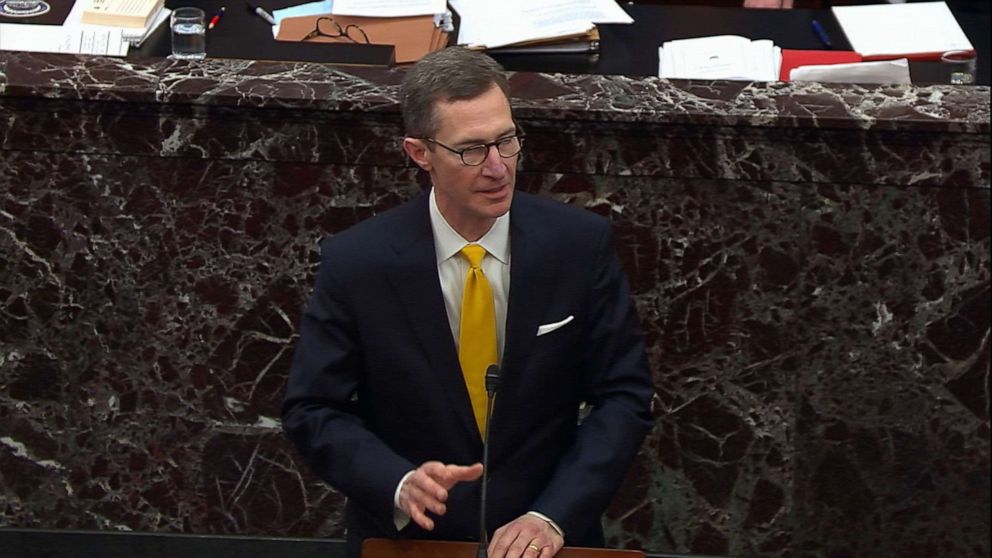
1:07 p.m. GOP moderates Collins, Murkowski and Romney pose first question about Trump's motives
Senate Majority Leader Mitch McConnell opens the first day of questions with a one submitted by GOP Sens. Susan Collins, Lisa Murkowski and Mitt Romney – all moderates - who could cast key votes on whether the Senate hears witnesses.
In a dramatic moment, Collins stands at her desk and says "Mr. Chief Justice."
"The senator is recognized," Roberts responds.
"I send a question to the desk on behalf of myself, Senator Murkowski and Senator Romney," Collins says.
Roberts then reads the question from the card brought from Collins to him by a Senate page: "This is a question for the president's counsel: 'If President Trump had more than one motive for his alleged conduct such as the pursuit of personal political advantage, rooting out corruption, and the promotion of national interests, how should the Senate consider more than one motive in its assessment of Article One?'" Roberts says, the reference to the first article of impeachment alleging "abuse of power."
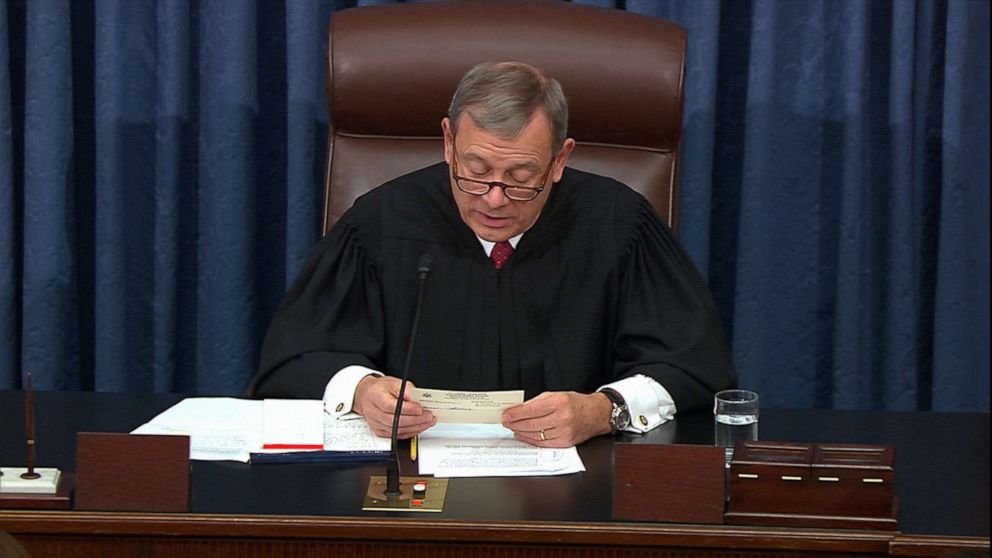
White House deputy counsel Patrick Philbin argues they only need to prove the president was acting in the public interest and says the president's motive alone is not impeachable.
"Once you're into mixed motive land, it's clear that their case fails. There can't possibly be an impeachable offense at all," he says.
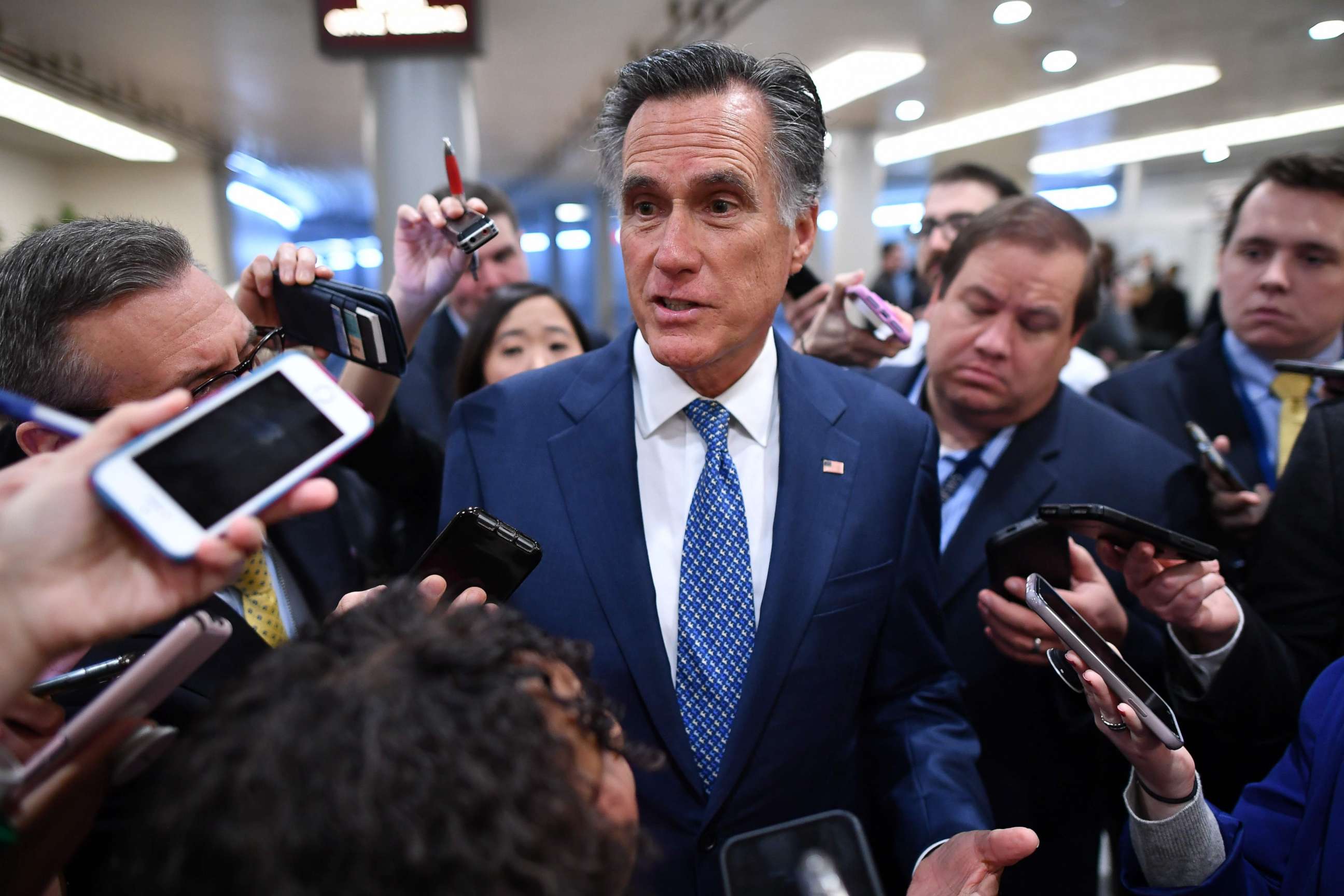
12:43 p.m. Romney now declines to say where other Republicans stand on witnesses
ABC News Senior Congressional Correspondent Mary Bruce reports:
GOP Sen. Mitt Romney tells reporters he doesn't know where other his fellow Republicans stand on calling new witnesses, but maintains additional information is needed from John Bolton.
"I'd like to hear from John Bolton because I think there are questions that I have that he could answer," Romney says.
Asked whether Bolton's credibility was at issue given the President's denial of his reported claims, Romney defended the former national security adviser.
"I have a great deal of confidence in John Bolton," Romney says. "I've known him for some time. He's a brilliant individual."
“John Bolton for instance may be able to tell us precisely when the decision was made not to provide the aid on an immediate basis to Ukraine and what the president's reasoning was at that point.
Romney was adamant that he could only speak for himself. While just a few days ago, the senator hinted that there was a growing number of Republicans who shared his concerns about hearing from Bolton, today he wouldn’t go that far.
“Where they stand now, you'd have to ask them, I can only speak for myself but I think there are questions John Bolton could help me resolve,” he tells me.
“I've made my point clear in our caucus meeting and people can make their own decision,” he adds.
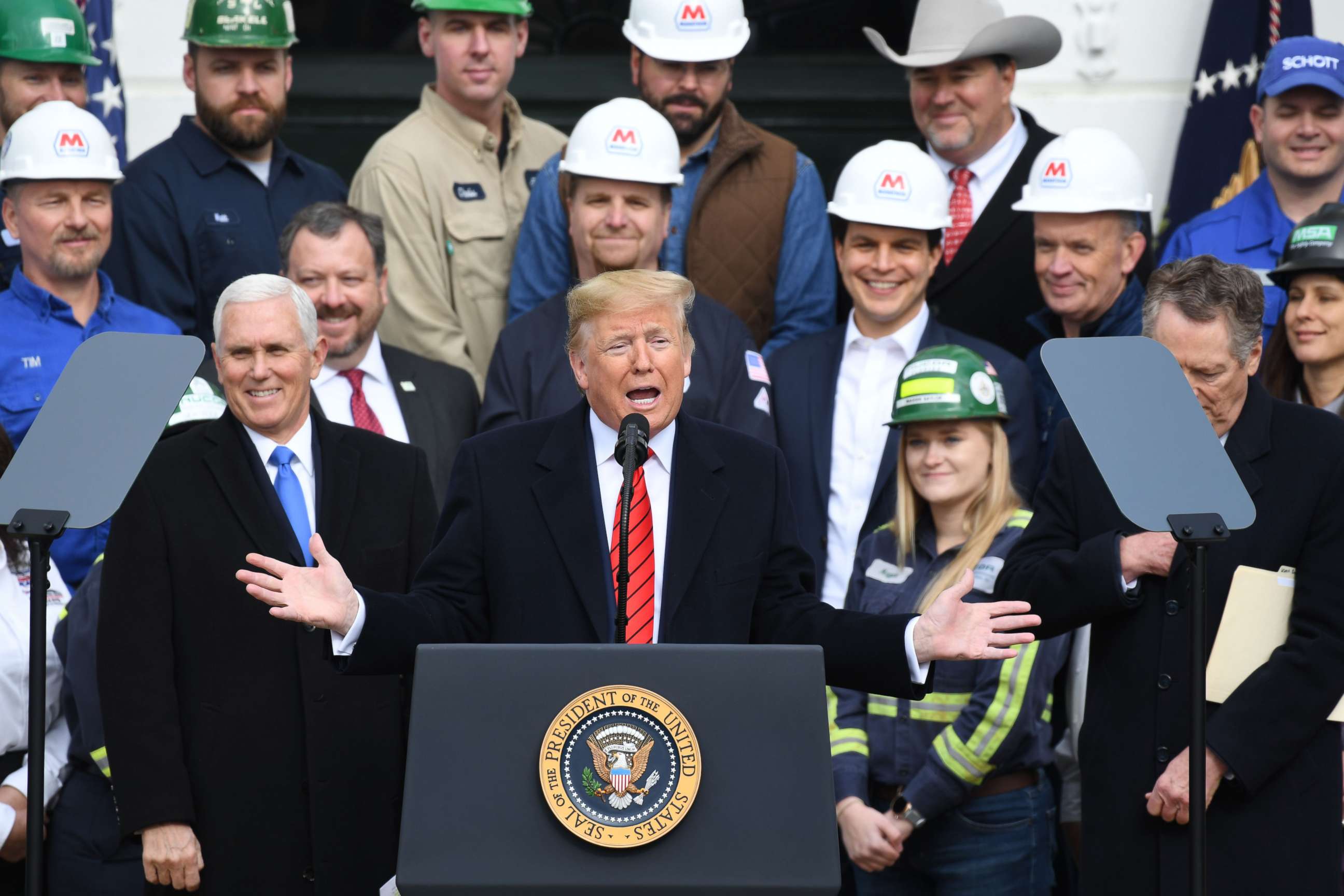
12:20 p.m. Trump ally Graham calls on president to stop attacking Bolton
ABC News Senior Congressional Correspondent Mary Bruce reports from Capitol Hill:
GOP Sen. Lindsey Graham is sending a not so subtle message to the president this morning, issuing a statement saying he is concerned about attacks on Bolton’s credibility.
“I am concerned when John Bolton’s credibility is attacked, it makes it more likely some will feel the need to call him as a witness,” Graham says.
The South Carolina senator just refused to stop at the cameras -- something I have literally never seen.
“It is my opinion, based on the law and facts, that additional testimony is unnecessary in this case," Graham says in the statement. “For the sake of argument, one could assume everything attributable to John Bolton is accurate and still the House case would fall well below the standards to remove a president from office.
“It is clear to me that there is ample evidence for the President to be concerned about conflicts of interest on behalf of Hunter Biden and that Vice President Joe Biden’s failure to take appropriate action was unacceptable. This combination, in my view, undercut America’s message on reforming corruption in Ukraine. There is a mountain of evidence to suggest the Bidens’ behavior was harmful to the United States," Graham's statement continues.
“The House managers’ claim that the sole reason President Trump temporarily paused the aid was purely personal and political, not public, does not withstand scrutiny. However, I am concerned when John Bolton’s credibility is attacked, it makes it more likely some will feel the need to call him as a witness. In that event, it would be important for the President and his team to call witnesses on other issues,” his statement reads.
Earlier Wednesday, Trump tweeted, "For a guy who couldn’t get approved for the Ambassador to the U.N. years ago, couldn’t get approved for anything since, “begged” me for a non Senate approved job, which I gave him despite many saying “Don’t do it, sir,” takes the job, mistakenly says “Libyan Model” on T.V., and ... many more mistakes of judgement, gets fired because frankly, if I listened to him, we would be in World War Six by now, and goes out and IMMEDIATELY writes a nasty & untrue book. All Classified National Security. Who would do this?"
"Why didn’t John Bolton complain about this “nonsense” a long time ago, when he was very publicly terminated. He said, not that it matters, NOTHING!" Trump tweeted.
12:07 p.m. Trump makes reference to Senate trial at USMCA trade deal signing
The ongoing impeachment trial looms over today's White House South Lawn event celebrating the signing of the new USMCA trade deal -- and the president makes no attempt to avoid the topic, even joking as he recognizes Republican senators in the crowd: “Maybe I'm being nice to them because I want their vote. Does that make sense?”
In one of his many shoutouts, the president recognizes his former 2016 primary rival Sen. Ted Cruz for being “incredible."
“Ted Cruz, boy has he been -- Boy, oh, boy, he's dying to get back there and ask those questions, I know -- he's sitting there, "Let me out of there, president! I want to ask those questions. He's got some beauties, I bet,” Trump says.
--ABC News' Jordyn Phelps at the White House
11:39 a.m. Schumer 'remains hopeful' of GOP votes for witnesses
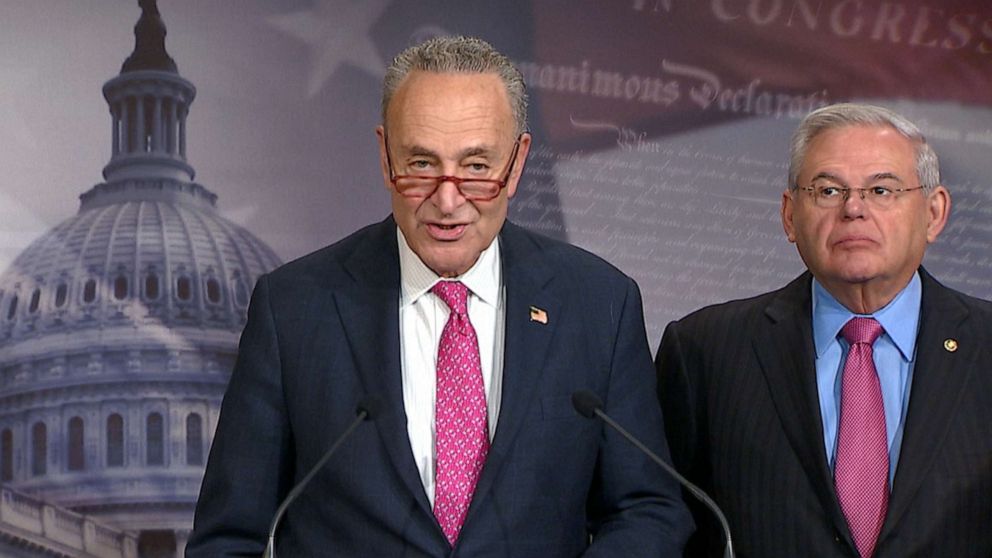
Speaking ahead of the trial Wednesday, Senate Minority Leader Chuck Schumer says he “remains hopeful” that four Republicans will join Democrats in voting for witnesses, telling reporters they are still “in the ballpark.”
“They're tying themselves in all kinds of pretzel knots to avoid the truth,” Schumer says, referring to opening arguments made by the president’s defense team.
He pushes back on Jay Sekulow’s defense of the president, saying it underscores the need to call witnesses.
“Four witnesses. Four sets of documents. The men who were in the room. No more, no less,” Schumer says.
“Mr. Sekulow’s version of a trial is Kafka-Esque. Remember ‘The Trial?’ Is that a short story or a novel?” Schumer says.
“It’s a novel,” Sen. Tim Kaine says.
Kaine later adds: “Before there’s a vote on acquittal or conviction, there’s going to be a vote on whether this is a trial, or a sham.”
“Americans know what trials are and what they are not.”
The consequences of voting against witnesses, Kaine says, would be to send Trump a message that “he can do whatever he wants.”
Schumer then responds to Manchin suggesting interest in calling Hunter Biden:
“We want witnesses and documents in the room where it happened,” he says. “It’s not up Joe Manchin or anyone else. The Republicans have the votes. They can call him today ... they don’t want to because they know it will be a circus.”
“It’s irrelevant and a distraction and running away from the truth,” he says.
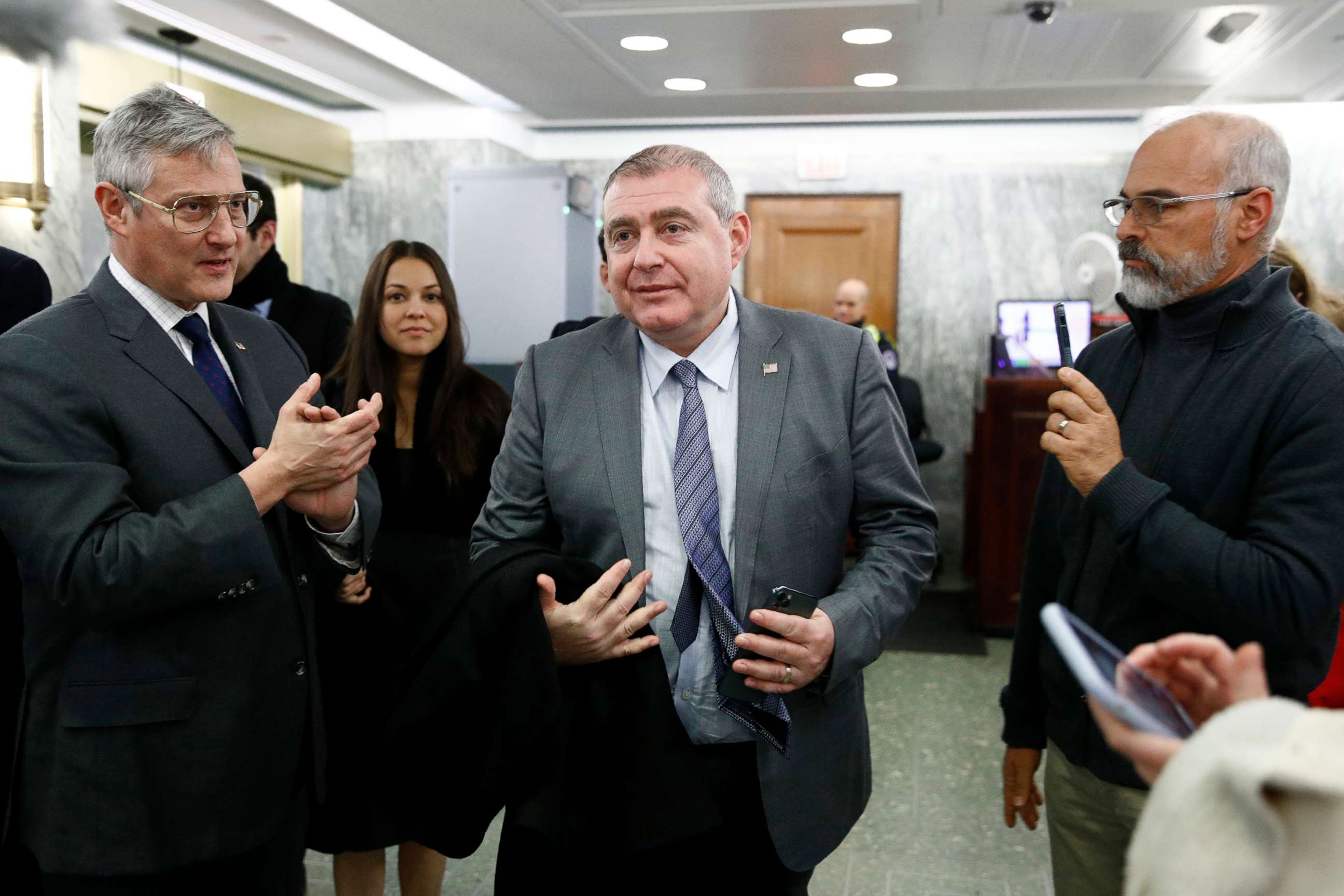
11:15 a.m. Giuliani associate Lev Parnas arrives to attend Senate trial
Lev Parnas, the indicted former associate of Rudy Guiliani involved in the his dealings with Ukraine, arrives on Capitol Hill to watch the impeachment proceedings as a spectator.
Parnas recently released a tape of President Trump ordering the firing of his then-ambassador to Ukraine, Marie Yovanovitch, which Democrats have seized on as evidence of the Trump's pressure campaign against the Ukrainian government. The existence of the recording was first reported by ABC News.
11:01 a.m. Murkowski meets with McConnell
ABC's Trish Turner reports GOP Sen. Lisa Murkowski met for 20 minutes Wednesday morning with Senate Majority Leader McConnell.
The pressure campaign on Murkowski and other Republican moderates continues.
As she leaves, Murkowski tells reporters, “You know I’m not going to share my personal thoughts with you this morning.”
Asked if she has a timetable for her decision on whether to vote for witnesses, she responds, “My timetable is kind of dictated, so I don’t think I’ve got a lot of options there.”
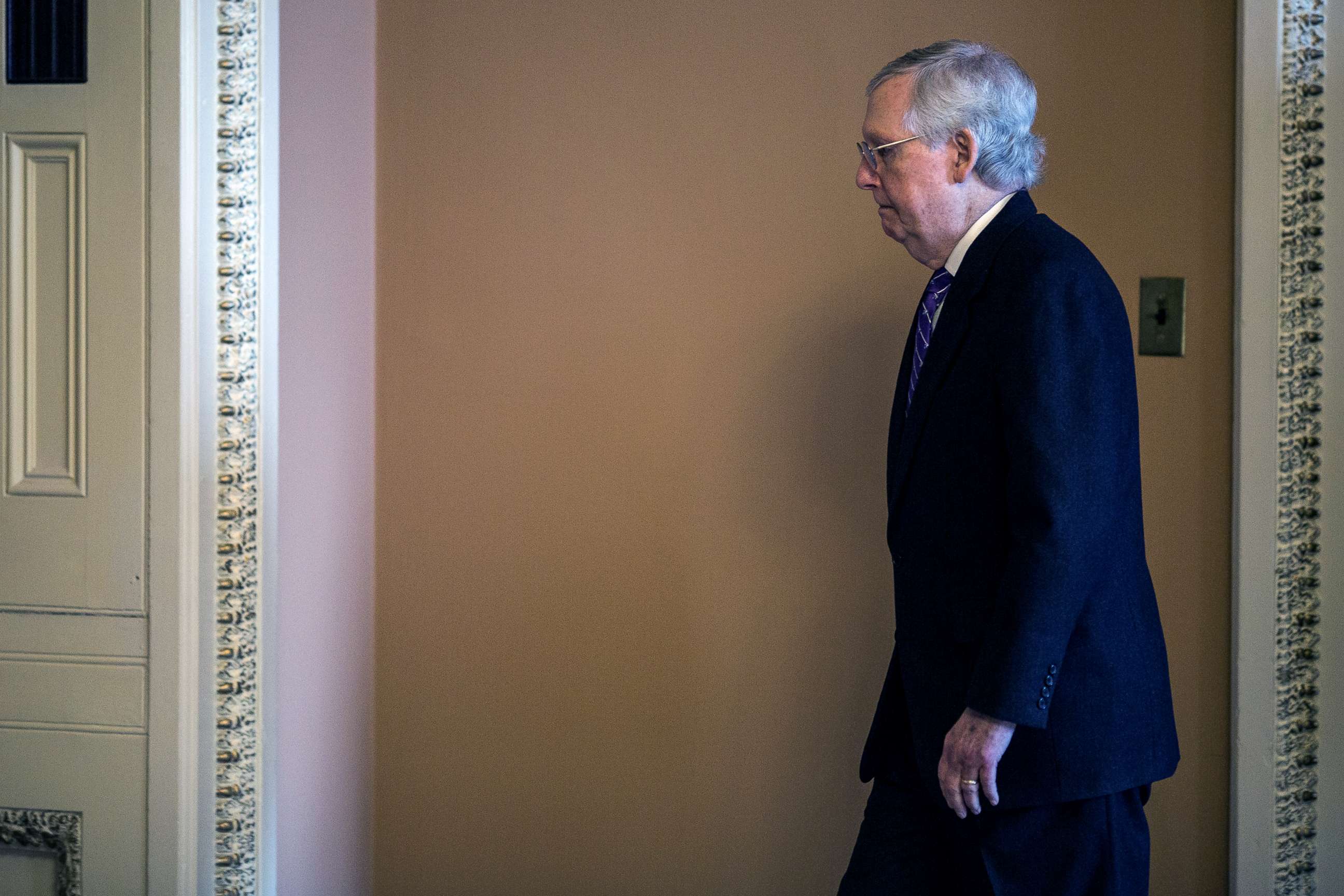
10:55 a.m. Democrat Manchin says Hunter Biden should testify
The dispute over whether the Senate should hear new witnesses is getting more complicated as senators discuss each party calling witnesses of their own.
Republicans have floated the idea of calling former Vice President Joe Biden and his son, Hunter.
Wednesday morning, Democratic Sen. Joe Manchin of West Virginia says Biden's son Hunter should be called to testify.
"You know, I think so,” Manchin says on MSNBC. “I really do.”
“If it's relevant, then it should be there," Manchin adds.
Trump’s defense team has pointed to Hunter Biden’s involvement with a Ukrainian energy company as evidence the President was right to ask officials there for help with an investigation. Despite the possible appearance of possible impropriety given his father’s diplomatic ties to Ukraine, no evidence has come to light that the Biden’s engaged in improper dealings.
During the impeachment trial of President Bill Clinton, Chief Justice William Rehnquist asked that senators' questions be answered in less than five minutes. Roberts, who has presided over the Trump trial, read Rehnquist's directive on Tuesday, and said, "I think the late chief's time limit was a good one and would ask both sides to abide by it."
Lawmakers have wide latitude in composing their questions. Sen. Josh Hawley, R-Mo., will submit questions about impeachment manager and House Intelligence Committee Chairman Adam Schiff and his staff's interactions with the intelligence community whistleblower who filed the complaint that helped prompt the Ukraine inquiry, along others related to former Vice President Joe Biden, his son Hunter Biden and Ukraine.
Democrats, for their part, are expected to press the Trump legal team on perceived weaknesses in their defense of the president and continue to make the case for witnesses in the trial before they force votes on motions for additional testimony and records.
They could also raise questions about what White House lawyers knew of Bolton's account of conversations with the president. The former Trump adviser submitted a manuscript of his forthcoming book to the White House for a classification review.
According to The New York Times, Bolton wrote that Trump told him over the summer that he wanted to continue freezing military aid to Ukraine until the country's government delivered on his push to investigate the Biden family.
The allegations that Trump tied the aid to investigations, which the president has denied, would undermine the White House's defense of the president in the impeachment trial.
The White House has told Republican senators that the lawyers arguing on Trump's behalf in the Senate, including White House counsel Pat Cipollone, had no knowledge of Bolton's account.
Both the managers and the president's lawyers could also rely on friendly senators to submit questions that help them reinforce their arguments to lawmakers.
The Senate could move on to motions and the question of whether to consider additional witnesses later this week.
Senate Majority Leader Mitch McConnell, speaking to Republican senators in a closed-door meeting Tuesday evening, said he did not yet have the votes to block a vote to consider witnesses.
A senior White House official told ABC News that the president's defense team still believes they will be able to defeat the measure to call witnesses.
"It's still a hard vote, but we are working hard. It's a long time until Friday," the official said.
The Senate's number two Republican, John Thune, said he thought the GOP conference was unified behind a plan that would allow Democrats to call a witness like Bolton in exchange for the GOP calling a number of witnesses of their own -- although that could end up being more witnesses than the Trump team would want.
Thune added that it was proving difficult to figure out how to manage what could become an unwieldy process.
ABC News' Mary Bruce, Trish Turner, Mariam Khan, Katherine Faulders and Jonathan Karl contributed to this report.

